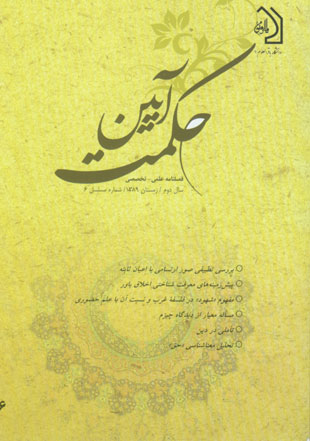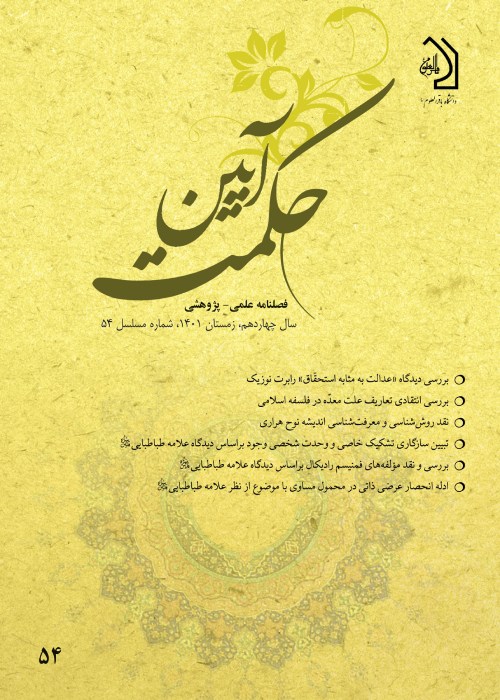فهرست مطالب

فصلنامه آیین حکمت
پیاپی 6 (زمستان 1389)
- 228 صفحه، بهای روی جلد: 15,000ريال
- تاریخ انتشار: 1389/11/11
- تعداد عناوین: 7
-
صفحه 7اعیان ثابته در عرفان نظری و صور ارتسامی در حکمت مشاء، مبنای بسیاری از مسائل دیگر هستند. این مقاله با رویکرد نظری و تحلیل عقلی به بررسی صور ارتسامی و اعیان ثابته و مقایسه آن دو از منظر ابن عربی و ابن سینا می پردازد وهدف آن یافتن نقاط اشتراک و افتراق دو دیدگاه در این مساله است. هر دو دیدگاه، ارتسام در علم پیش از ایجاد را پذیرفته اند و تفاوت آنها در این است که عرفان، ارتسام را در علمی مطرح می کند که تمایز نسبی با ذات دارد و فلسفه، در علمی که عین ذات است.
کلیدواژگان: صور ارتسامی، اعیان ثابته، علم پیش از ایجاد، ابن سینا، ابن عربی -
صفحه 35معرفت شناسی دانش متکفل شناخت است که از ماهیت، صدق و توجیه باورها سخن می گوید. در میان نظریه های توجیه، ایده اخلاق باور بر آن است که در فرآیند باور کردن و اکتساب عقاید، بایسته های فراوانی حاکم است که تخلف از آنها علاوه بر خطای معرفتی بودن، گناهی اخلاقی نیز شمرده می شود و بنابراین مساله ای اخلاقی - معرفت شناختی است. کسی که به اخلاق باور فتوا می دهد، مبناهایی را در معرفت شناسی اتخاذ کرده که در صورت رد شدن آنها جایی برای این ادعا باقی نمی ماند. این پژوهش به برخی از مهم ترین پیش-زمینه های معرفتی اخلاق باور و نیز نظریه های رقیب آنها می پردازد که از آن جمله قرینه گرایی، درون گرایی، وظیفه گرایی و اراده گرایی است.
کلیدواژگان: اخلاق باور، معرفت شناسی، قرینه گرایی، وظیفه گرایی، درون گرایی، اراده گرایی -
صفحه 65واژه شهود در فلسفه و عرفان اسلامی، علم حضوری را تداعی می کند؛ علمی که در آن وجود معلوم نه مفهوم آن نزد عالم حضور دارد و احکام خاصی بر آن مترتب شده، اهمیت ویژه ای دارد؛ چندان که مبنای حل پاره ای از مهم ترین مسائل معرفت شناسی قرار گرفته است.
اما واژه «intuition» که معمولا به شهود ترجمه می شود، در فلسفه غرب دارای معانی گوناگونی است. ریچارد رورتی در نوشته مهم خود با همین عنوان، شش معنای اولیه را برای آن بیان می نماید و چهار معنای مهم تر را بررسی تفصیلی می کند. این مقاله ضمن بیان معانی گوناگون «intuition» (شهود) در فلسفه غرب، نسبت این معانی با علم حضوری را کاویده و به این نتیجه رسیده است که معانی گوناگون شهود در فلسفه غرب بیشتر بر مفهوم بداهت منطبق است تا علم حضوری. همچنین آنجا که از آن واژه، معرفت بدون واسطه نماد یا مفهوم اراده می شود، مقصود علم حضوری با مفهوم خاص آن نزد فلاسفه مسلمان نمی باشد.
کلیدواژگان: شهود علم حضوری، ریچارد رورتی، فلسفه تطبیقی، معرفت شناسی تطبیقی -
صفحه 111این نوشتار، ترجمه و نقد کتابی از ردریک ام. چیزم در زمینه معرفت شناسی است. نویسنده این پرسش را مطرح می کند که «چه معیاری برای دستیابی به معرفت داریم؟» و با رویکردی نسبتا تاریخی، پاسخ های احتمالی به آن را بررسی می کند و در پایان سعی دارد پاسخی به اشکال شکاکیت ارائه دهد. این کتاب به رغم حجم اندک آن تقریر مناسبی از مساله مورد بحث دارد که همین امر بر اعتبار کتاب افزوده است. در کنار ترجمه متن کتاب، نکاتی در قالب نقد به آن افزوده شده است.
کلیدواژگان: معیار معرفت، صدق، شکاکیت، توجیه، چیزم -
صفحه 147مساله «قلمرو دین» از بحث های مهم در فلسفه دین است که با مباحث مهمی چون «تعریف دین»، «رابطه دین و سیاست»، «کارکرد دین» و «گوهر و صدف دین» ارتباط دارد. سوال این است که میزان دخالت دین در امور دنیوی و نیازهای مادی چقدر است؟ راهنمایی دین در زمینه مسائل معیشتی تا چه حدی است؟ به دیگر سخن، گستره دین تا کجاست و تا چه اندازه می توان متعلق دینداری را توسعه داد؟ در این رابطه دو نظریه حداقلی و حداکثری مطرح شده است. این پژوهش می کوشد تا بعد از مفهوم شناسی دین، به بررسی قلمرو دین از دیدگاه برخی از اندیشمندان بپردازد.
کلیدواژگان: دین، قلمرو دین، دین حداقلی، دین حداکثری -
صفحه 173یکی از مباحث مهم فلسفه حق تبیین معناشناختی و نیز بررسی اقسام گوناگون حق است. این مقاله نخست معانی گوناگون حق را بر رسیده و سپس به اقسام آن پرداخته است. حق در لغت به معانی گوناگونی به کار رفته است و معانی اصطلاحی متعددی دارد. در آثار متفکران مسلمان حق به معانی چندی از جمله سلطنت و امر اعتباری ای که اثرش سلطنت است به کار رفته است. برخی آن را دارای ماهیت تکوینی دانسته اند اما برخی دیگر آن را دارای ماهیت اعتباری. متفکران غربی نیز نظریات مختلفی درباره معانی حق ابراز داشته اند عده ای آن را همان سود دانسته اند و برخی آن را شکلی از انتخاب و معانی دیگری نیز بیان شده است. حق تقسیمات گوناگونی دارد از جمله تقسیم حق به حق قانونی و حق اخلاقی؛ در این تقسیم که تقسیم به لحاظ منشاء حق است از قسم دیگر یعنی حق دینی غفلت شده است. تقسیم دیگر حق، تقسیم آن به اهم و مهم است.
کلیدواژگان: حق، حقوق، حق تکوینی، حق اعتباری، حق قانونی، حق اخلاقی، حق دینی -
صفحه 213
-
Page 7Archetypes in theoretical mysticism and representations in Peripatetic philosophy are regarded as basic in resolving many problems. By theoretical approach and rational analysis this article attempts to examine representational forms and archetypes comparing these two from Ibn Arabi and Ibn Sina with the view of finding out similarities and differences their views in this regard. Both views agreed with representational forms in respect with Divine Foreknowledge (God's Knowledge before creation) but the difference of opinion lies in the fact that mysticism maintains representation in a knowledge which is somewhat distinct from Divine Essence while in philosophy this representational knowledge is considered identical with His Essence.
-
Page 35Epistemology is a science dealing with knowledge in terms of nature, truth and justification of beliefs. Among the theories of justification is the theory of ethic of belief according to which there are many requirements in the process of believing and acquiring knowledge that any failure in regard to them may give rise to not only epistemic error but ethical sin as well. It is accordingly a moral-epistemological problem. To maintain the ethic of belief is to adopt principles in epistemology which there is no room for such claim if they are rejected. This article deals with some of the most important epistemic backgrounds of ethic of belief and its rival theories including evidentialism, deontology, internalism and volitionism.
-
Page 65The term "shohud" [intuition] in Islamic philosophy and mysticism is associated with presential knowledge, a sort of knowledge in which the existence of known object rather than its concept is present to the subject (knower) with especial properties and of especial importance that is basic for resolving some of the most important problems in epistemology.In Western philosophy, however, this term intuition is used in different meanings. Richard Rorty in his important essay under this title listed six primary meanings for the term and discussed four important of them in detail. The present article is to deal with various meanings of intuition in the west and their relations with presential knowledge with the conclusion that these different meanings apply more to the concept of "self-evidence'' than presential knowledge. It also concludes that in cases where this term is used in the sense of knowledge without the means of symbol or concept it does not mean presential knowledge in its narrow sense of it with the Islamic philosophers.
-
Page 111This article is translation and critique of a work by Roderick M. Chisholm on epistemology. The author raised the question of what criterion we have in acquiring knowledge and then with a rather historical approach examined possible answers to the question and finally tried to give an answer to skepticism. Small as it is, the book has a proper statement of the problem in question which added to its original value. In addition to Persian translation, some critical points are provided by translator
-
Page 147The problem "realm of religion" is one of important questions of philosophy of religion which is related to such important problems as "definition of religion", "relation of religion with politics", " function of religion" and "kernel and shell of religion". The question is the extent to which religion can play its part in secular affairs and material needs. In regard to livelihood matters what guidance is given by religion? In other words, how far is the extent of religion and how much can object of piety be extended? In answering to these questions there are two maximalist and minimalist theories. This article is an attempt to give a conceptual analysis to the concept of religion and study its domain from viewpoint of some Islamic thinkers.
-
Page 173One important problem in philosophy of right is semantic explanation as well as examination of various types of rights. This article is an attempt to study different meanings of right and to give treatment to its various types. Literally Haqq (right) is used in different meanings and it has technical meanings as well. In works of Islamic thinkers haqq is used in several meanings including dominion and conventional concept which is the origin of dominion. Some thinkers regard it to be of ontological nature but to some it is of metal construction. Western thinkers are of different opinions about the meanings of right. To some of them it is the same as utility. To some, a form of choice but there are other views too. Right can be of different divisions such as legal right and ethical right. In this division which is done in terms of source of right, one type i.e. religious right is ignored. Right can be divided in terms of degrees of importance.


